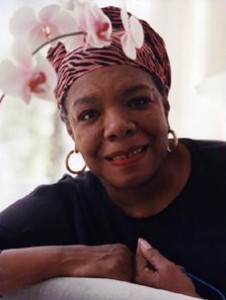I first met Maya Angelou as a college student at Tufts University in Medford, MA. After her free-wheeling and often theatrical presentation to a room full of awestruck young peopole, I shyly approached her to talk to her about the love we both shared for the poetry of Edgar Allen Poe. Ms. Angelou stood, unfolding her full, impressive height, which up close was daunting. “Read, read and read,” she belched out in her deep, sonorous voice, a non-sequitur to my comment. Startled by the whole experience, I stumbled backward, almost falling into one of the auditorium seats.
I would see Ms. Angelou twice more—once again at college, and finally in NYC, where she “headlined” a Unity Church service.
I can’t remember when I read Ms. Angelou’s autobiography, I Know Why the Caged Bird Sings. But I do remember as a child raised in Africa, being transported to a puzzling time of racial segregation in Stamps, Arkansas, and being introduced to Maya’s struggles with her own self worth, and ultimately her rape by her mother’s boyfriend. When it was suspected that her uncles killed the pedophile in retaliation, she stopped speaking for several years. After all, her words killed people, a child’s logic.
I was impressed by the warmth and humanity of Maya’s grandmother, a small shop keeper who lent money to others without regard to race during the Depression, and who sang solos at church, coaxed on by the community of the faithful each Sunday. Maya’s grandmother prayed for and encouraged Maya, whom she knew would speak again “when she got ready.” Unfettered faith.
I also felt great compassion for Maya’s uncle, a crippled man who was hidden in a barrel of produce in the shop during KKK raids because he could not run to the family hiding place. At the Unity service, Ms. Angelou told the crowd how many successful individuals from all walks of life had told her that they worked in the store with her uncle, and that he taught them math and the basic business skills that they employ, even today. Simple acts.
What I most appreciate Maya Angelou for is her directorial debut for the movie Down in the Delta, featuring Alfre Woodard and Wesley Snipes in the leads, and including Esther Rolle in her final, poignant appearance as a woman battling dementia. Down in the Delta, the story of a family on the skids until they reclaim their history and their better selves, is one of my all-time favorite films. Beautifully done.
Ms. Angelou, mother, teacher, friend, poet, actor, singer and Civil Rights activist, has been quoted mightily over the years, but my all time favorite quote, words that have played themselves out multiple times over the years are as follows: “The first time someone shows you who they are, believe them.”
Maya Angelou, once mute, has a voice that has been and will continue to be heard for all time. RIP .


You must be logged in to post a comment.